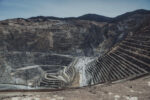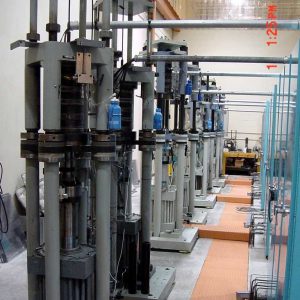Research for the Solution Mining Research Institute
Operators of gas storage caverns in rock salt have historically used seasonal pressure cycles; however, cavern operators are increasingly using pressure cycles on the order of months and days. Compressed-air energy storage (CAES) technology relies on daily pressure cycles with fast drawdown and pressurization cycles. Increased reliance on natural gas for peak-power generation and as a commodity traded on short-term markets has similarly increased the need for rapid cycling over days or hours. As a result, questions have been raised regarding the effects of the shorter stress and thermal cycles on the creep behavior, dilation potential, damage accumulation, and thermal properties of salt.
RESPEC began a research project in 2010 for the Solution Mining Research Institute (SMRI) to address rock-mechanics concerns related to faster withdrawal and injection rates. The research was conducted in parallel with the Institut für Aufbereitung und Deponietechnik (Chair for Waste Disposal Technologies and Geomechanics) at the Clausthal University of Technology (TUC) in Clausthal-Zellerfeld, Lower Saxony, Germany. The last of four phases was completed in fall 2020.
The first phase involved cyclic loading effects on the dilation and creep properties of Avery Island salt. One test was cycled below and one above the dilation limit of the salt. During each test, the axial stress was cycled between two values for 30 days to evaluate the potential of salt damage during cycling. The second phase was similar to the original phase; however, the tests were performed in triaxial extension rather that triaxial compression. The third phase involved 30-day creep testing where the temperature was cycled between 10 degrees Celsius (°C) and 50°C, and the potential for damage was measured using ultrasonic velocities and volumetric strain measurements. The final phase determined the thermal expansion of salt under constant-stress and control-strain triaxial conditions. These tests were performed to evaluate the thermal expansion coefficients and elastic properties of damaged and undamaged salt.
The following research reports are available through the SMRI member website.
- Mellegard, K. L. and U. Düsterloh, 2012. High Frequency Cavern Cycling – Phase 2: Cyclical Loading Effects on the Dilation and Creep Properties of Salt, SMRI Research Report RR2012-2, prepared by RESPEC, Rapid City, SD, United States, and Clausthal University of Technology, Clausthal-Zellerfield, Germany, for the Solution Mining Research Institute, Clarks Summit, PA.
- Mellegard, K. D., 2013. High Frequency Cavern Cycling – Phase 2-B: Extensional Cyclic Fatigue Testing of Salt, SMRI Research Report RR2013-02, prepared by RESPEC, Rapid City, SD, for the Solution Mining Research Institute, Clarks Summit, PA.
- Buchholz, S., E. Keffeler, and U. Düsterloh, 2017. Cyclic Thermal Loading Creep Tests, RSI-2694, SMRI Research Report RR2017-3, prepared by RESPEC, Rapid City, SD, United States, and Clausthal University of Technology, Clausthal-Zellerfield, Germany, for the Solution Mining Research Institute, Clarks Summit, PA.
- Buchholz, S., E. Keffeler, and U. Düsterloh, 2020. Determination of Thermal Expansion Coefficient by Stress Controlled and Volume Controlled Triaxial Tests to Address Thermal Induced Stresses in Cyclic Storage Caverns, SMRI Research Report RR2020 2, RSI-3013, prepared by RESPEC, Rapid City, SD, United States, and Clausthal University of Technology, Clausthal-Zellerfield, Germany, for the Solution Mining Research Institute, Clifton Park, NY, United States.




Stay in Touch